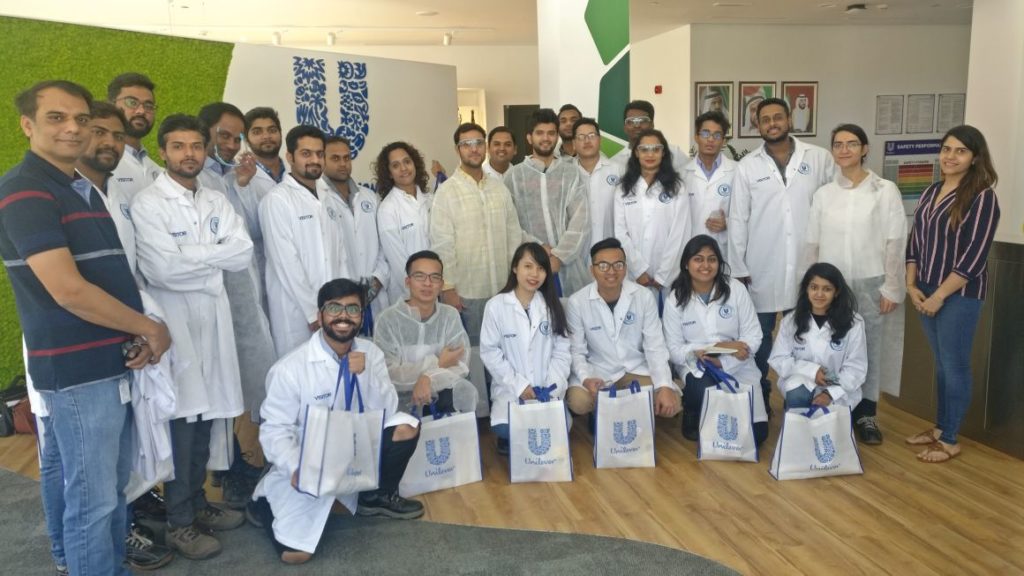The Growing Personal Care Industry – What I Learnt During My Visit to Unilever Dubai

Unilever, the Anglo-Dutch major, exports products with a “Made in the UAE” label and has built a Dh1 billion factory in December 2017 dedicated to personal care. Personal Care is Unilever’s largest product segment, generating approximately €20.17bn or 38 per cent of total turnover in 2016. The company, which is listed on the New York Stock Exchange, manufactures personal care brands including Vaseline, Sunsilk, and Tresemme, as well as food and beverage brands such as, Lipton, Bovril and Ben & Jerry’s.
The booming rise of Consumer Goods in the UAE and Middle East
The UAE, the region’s biggest personal care market that was worth $2.15bn in 2016 according to Euromonitor.
During our Global Learning visit to Unilever on 19th April, we learnt how the Dubai Personal Care factory is central to growth and potential given the high per capita income in countries like the UAE and Qatar, and even countries like Egypt, Sudan, Algeria and Morocco, which are still emerging markets in terms of personal care consumption.
It is reported that global consumer goods companies are pumping billions of dollars in investment into the Middle East to tap the growth opportunities offered by young populations and rising levels of spending in many countries. The beauty and personal care products market in the UAE is expected to grow to $2.72bn in 2020 from $2.15bn this year, according to research by Euromonitor International published in 2017.
In the MENA region, the largest markets for the segment are Saudi Arabia, Iran, the UAE and Egypt. In the Middle East and North Africa region, the market is expected to grow to $24.39bn in 2020, up from $18.05bn this year, according to the research company.
Key Takeaways
1. Importance of safety & openness for further improvement: For Unilever, the first and most important priority is safety. There are 3 assembly areas which are located at strategic points for quick exit. Inside the plant, there are different paths provided for emergency exists and visitors’ movement. On reaching the factory, we were briefed about their safety regulations. All the safety precautions were taken before we entered the factory. Moreover, they have 80% quality and safety index. Proper PPE is given to every person going inside the operating floor and people were guided in using those PPE. It was interesting to note that no accidents had happened on-site in over 1000 days. They also encourage visitors (fresh eye view) to give feedback on improving the safety.
2. Efficiency & sustainability: The factory has a big solar panel generating 2 MW power and propagates 100% waste recycling. Designed in a straight-line manner, they have a minimum inventory holding policy. The finished goods are directly supplied to the customers’ warehouse, with transportation done via shipping or road. The plant in designed to utilise minimum resources (piping, steel and cable) during construction.
3. State-of-the-art equipment: The factory based at Dubai Industrial Park is the largest personal care facility for Unilever in the region and is reported to export about 80 per cent of the items produced at the facility to 80 countries in the Middle East, North Africa and Europe. During the visit, we observed the state-of the-art equipment and world class manufacturing methods being followed at every level. For instance, the machine that produces Vaseline produces 250 tubs per minute and operates at an efficiency of 60%. The empty bottles, tubes and tubs are bought from a supplier which are stored in the warehouse for not more than 2 days.
4. Strategic location: The 100,000 square meter plant targets production of 500 million items per year at capacity. The plant is in close proximity to the suppliers, leading to considerable logistics cost reduction.
5. Automation: The process is almost 80% automated but important operations where quality is of utmost priority are overseen by a qualified employee. The operations are automated to the extent they are supposed to be, highlighting the emphasis on cost optimisation at every level.
Some of the other good points to be noted at Unilever include gender equality, cross learning within the teams, world class manufacturing methodology, service level KPIs with internal and external customers, and omni-channel supplier system, among others.
About the Author: Srinivasa Rao Achanta

Srinivasa Rao Achanta is a Global MBA student from the Jan 2018 cohort specialising in Logistics and Supply Chain at SP Jain School of Global Management. Prior to joining the program, Srinivasa has worked with ITC Ltd (India) as Assistant Manager for 6 years in manufacturing. He also holds a Green Belt certificate in Six Sigma. Aspiring to become a leading supply chain consultant at the global level providing innovative solutions to chronic issues in achieving the best in class efficiencies, Srinivasa enjoys spending quality time with his sibling, networking with people, playing cricket and volleyball, exploring nature.




